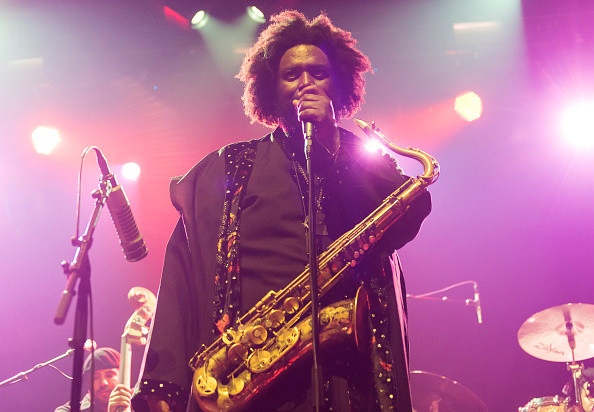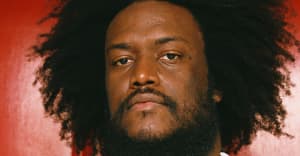 Getty Images
Getty Images
Last week, I was on a dancefloor in an abandoned generating plant in Toronto for a massive rave thrown by some friends in partnership with a local arts festival. At about 2 a.m., the crowd split and in floated Kamasi Washington. He was wearing the same royal blue dashiki he’d sported on stage at the Danforth Music Hall earlier that night and carrying a large carved wooden walking stick in lieu of his tenor saxophone. Washington is a magnet — whether it’s his stature or his playing, you can’t help but notice him. In a busy crowd comprised of some of Toronto’s weirdest and queerest, he was unmissable. Even amongst the stratospheric, jazzy furor that was Kendrick Lamar’s 2015 opus, To Pimp A Butterfly, the reedy wheeze of his saxophone seeped through.
Washington’s participation on Butterfly was something of a commercial breakthrough for the 35-year-old, L.A.-raised, son of a musician. But it was his own album, The Epic, released in May of 2015, that lifted him to the status of jazz’s newest savior. If not for it's content, which feels vital and cascades in a compelling erratic form, like hot lava, but for its length. Who makes a three-hour record in 2016? Someone who has a lot to say.
Your come up as a student, as a member of Snoop’s live band, as a listener has been widely documented, but what have you learned about making music, or playing music, in the last year?
I’ve been playing so much, and especially playing so much of my own stuff: I’ve done more personal gigs this year than I have the past five years, combined. Music’s elusive sometimes. You hear it in your head, but can’t grasp it. But the more I’m playing like this, I can grab that elusive thing very easily now—and I grab it every time. We just did this recording recently and I felt like everyone in the band was really centered. Usually we’re all chameleons: somebody’s asking you to be something different every day. But in this gig, I’m just trying to let everybody be what they want to be. And so that has kind of… I feel like I’m more in tune with who I am more so than I’m really learning something else. You know what I mean? It’s more introspective learning. Musically, the mystery I hear in my head is less of a mystery: I know what it is now. I’m probably due for a good delve into something else, to add to who I am.
Do you think that learning ever stops?
Nah, none of that happens. You always want to keep growing, because you can only play what you play for a certain amount of time. Imagine you’re a hunter: you can only hunt a certain thing for so long before the herd moves. Sometimes you find a good place and you’re really happy because the music sounds good, and everything’s going well, but that will only last for a time. It will start to become repetitive. For me, at least, the excitement of music is the unknown. Once you really really know it, you have to introduce unknowns to keep the energy and the spirit of music the same. I’m kind of like that right now: the unknown is becoming a little known. The fog is really starting to kind of settle.
Musically, the mystery I hear in my head is less of a mystery: I know what it is now.
 Mark Metcalfe / Getty
Mark Metcalfe / Getty
For the average person, who might not know so much about jazz, it seems like a genre for the restless: there are millions of permutations you can explore.
Yeah, but after a certain point you get used to the million permutations, and you want 10 million permutations. Or you no longer have the physical capacity to drive forward anymore, so it’s just kind of the twilight of your career. Gerald Wilson was one of my mentors: he was in his nineties before he passed and, literally, every time I saw him he’d be like, ‘Man, Kamasi, I’ve got this new thing! Nobody ever heard anything like this before!’ It’s amazing hanging out with somebody that was born in 1918. He was around when segregation was real. His grandparents were dealing with slavery, basically. It’s interesting to talk with musicians that have that many years behind them because it’s almost like a time warp, and it blends into what life is like. Music is an expression of life, who you are, and what you’ve been through. So it’s a kind of trippy thing to relate to someone who lived in a completely different time.
I imagine that the root instinct is protective, but why are people so hung up on policing the parameters of jazz?
The parameters are from the words, and the music is the music. I've always been puzzled by that: why do you care so much about this word having a specific definition? This music cannot be contained by one word, there's too much of it. Funk could very easily be called jazz, but you call it funk. Does that really matter? People dig that they associate themselves with certain genres, but the genres to me are made up things like an imaginary world. From the jump, I never really took it seriously. Like Radiohead: is that rock-n-roll or is that electronic? And I'm like, I don't care, call it whatever you want to call it. Why is what name I put on this important? Jazz is so wild, so vast. There's so much music in here and they call it "jazz." Over 100 years worth of it. Millions of songs. Thousands of albums. Thousands, and thousands of artists.
Why does it feel like there is so much important artistic work emerging from L.A. right now though?
L.A. has always been hated on so much. I remember the first time I went to New York, I was at jam sessions and people would hear me and come up to me and be like, ‘Oh wow, you’re from L.A.? Really!?’ L.A. has always had amazing music for the longest time, but a lot of it never left. So there are all these local heroes. What that did is create a nest from the pressures of popularity. L.A. has always been a place about "originality". You don't find a lot people playing the same way. The people who are dope, the people who can play all types of music play their music in a unique way. It’s nonconformist, do-your-own-thing. And it's kind of chill, so there's nothing to be upset about. All of a sudden there's attention around us, and people trying to figure out ‘how did you guys do that?’ There was no pressure to conform, so there's always original ideas floating around; and people have not only this sense of freedom, but also a lot of opportunity. It's a really big city, so you can do anything you want to do.
